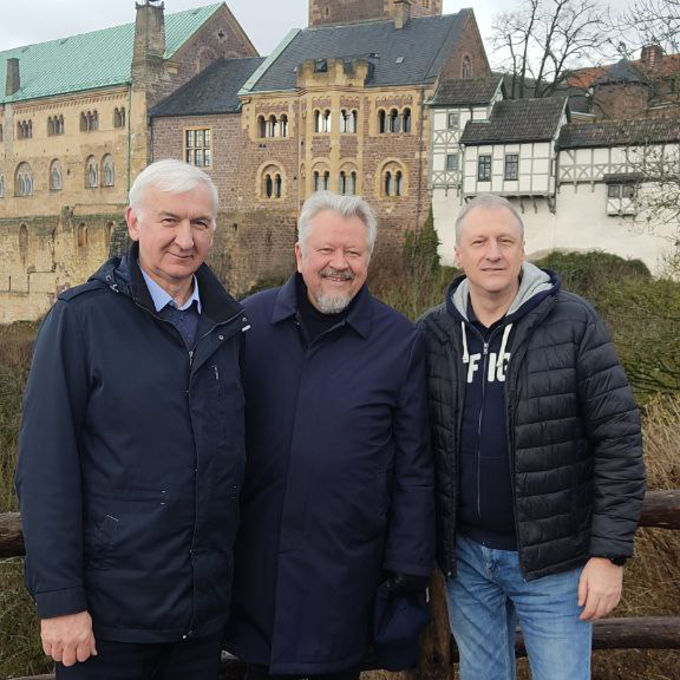
UECB Leadership Visits Germany
The Russian delegation's trip to Germany included a meeting with the leadership and staff of the Bible Mission, a meeting with the leadership of the UECB Churches of Germany, and a rich cultural program.
The Bible Mission was formed by Johan Pauls, who moved from the Soviet Union to Germany in 1978. His pastoral heart and love for the people of his native country prompted him to find a way to provide the people living in the USSR with the Holy Scriptures. Johan Yakovlevich was convinced that every person has the right to have their own Bible. This belief became the motto of his work. It all started with renting a hangar from a garment factory for storing literature. There were many who wished to participate in this charitable work, and the mission expanded its work... In 1984, the Bible Mission was officially registered. Until 1998, the Bible Mission was united with the Slavic Gospel Association (SGA), then the mission began to work independently, developing its activities, not only distributing spiritual literature, but also carrying out many social projects. Bible Mission is always where the trouble is. It provides assistance to those affected by floods, earthquakes, fires and hostilities. The mission sees the needs of the destitute, the poor, orphans and, in cooperation with the churches, provides the necessary assistance. Today the Bible Mission covers 20 countries with its charitable ministry. Throughout the entire period of its activity, the Bible Mission has been closely cooperating with the churches of the Russian Union of Evangelical Christian Baptists and has been a faithful partner in various church ministries. The mission office is located in the city of Niederberg, they have their own building. In 1999, a prayer house was built for the church next to the office. It was built by new converts to the faith, thanks to the evangelism of the Bible Mission. The office currently has 23 employees. The mission is led by three co-chairs of the board of directors: Albert Frese, Pavel Gagelgans, Gerghard Friesen. During the meeting between the leadership of the Russian UECB and the Bible Mission, a high assessment was given to the work of the mission on the territory of Russia and gratitude was expressed for this great work. New prospects for interaction between Russian UECB and Bible Mission were also discussed.
On February 21, the Russian UECB leadership visited the office of the German UECB in the city of Detmold. The Russians were received by the chairman of the union, Heinrich Klassen, with his assistants. This was the first meeting of the leaders of the two unions. And, although its participants represented different countries, they demonstrated the true power of Christian unity, as well as the ability to be light and salt in this world. As true children of God, they are peacemakers in today's international environment. The churches of this union distance themselves from participation in political processes and focus on evangelism and upholding biblical Christian values. German Union consists of 50 churches, and every year their number increases and the churches themselves grow. While the leaders of each Denomination got acquainted with one another, conversation sparked mutual interest in further joint cooperation. Prayers were made for world peace. Then the Russians visited the nearest church, a majestic building which can accommodate 1,300 people. Six choirs and a symphony orchestra serve in the church, and organized church life attracts more and more people to God and to the church. The leadership of the German Denomination expressed gratitude to the representatives of the Russian UECB for their visit and fruitful communication.
Also during the visit, the Russian delegation visited their close friend and longtime collaborator Franz Thyssen, who headed the UECB of Kazakhstan for 30 years. In May 2022, he moved to his relatives in Fulda, Germany. The meeting with Franz was very meaningful, joyous and rich. There was not enough time to talk about everything, as it always happens when meeting close friends.
As part of the cultural program, the Russian leadership visited historical places associated with the life and work of Martin Luther: Wartburg Castle in Thuringia on a mountain near the city of Eisenach, where Martin Luther hid from persecution from May 1521 to March 1522. Here he made a translation of the New Testament into German. They also visited the city of Wittenberg in Saxony, where the Church of All Saints is located, on the doors of which Martin Luther nailed his famous 95 theses. And of course, during a tour of Wittenberg, it was impossible not to go to the great reformer’s museum.
They also visited Buchenwald, one of the largest concentration camps in Germany, located near Weimar in Thuringia. From 1937 to 1945, about 250,000 Jewish prisoners passed through the camp, in which at least 56,000 were killed. Currently, it is a museum memorial to the victims and atrocities of Nazism during the Second World War.
Overall, the trip to Germany served to establish closer relations with foreign organizations and corresponded to peacekeeping tasks. It was a great use of time.

































